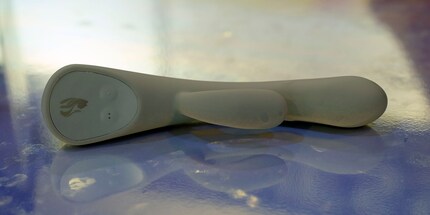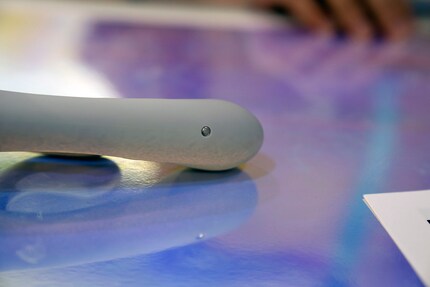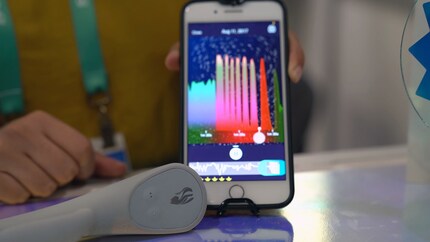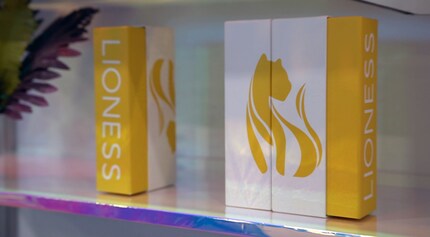
Background information
We need to talk about Samsung's future plans at CES
by Dominik Bärlocher
The CES has a problem with sex. And women. The latter are now solving the former by proudly developing and showcasing smart vibrators.
Away from the main exhibition halls, on the second floor, in front of the media room, there is a small stand. At the stand is Liz Klinger, founder of the vibrator company Lioness. She is one of the women who are not only shaking up the tech scene but also fighting on the front line for women at the CES tech fair in Las Vegas.
With her smart vibrator, Liz Klinger has received an award from the jury of the CTA, the organisers of the CES. The CTA is thus making up for a misstep from last year. Back then, the sex toy company Lora di Carlo received an award from the CTA, which was then cancelled. The reason: the vibrator was obscene. After the outrage online, Lora di Carlo received it back again.

Liz and Lioness are one of the few companies exhibiting Love Toys at CES this year. But the vibrator from Lioness is the smartest. Because the device learns from you. The company behind Lioness does a lot for sexual health, but is looking for its place on the internet.
Orgasms work exactly the same for men and women. Contractions in the abdomen, increased heart rate, dopamine and oxytocin are released, you feel good. Smart devices can measure two of these things with skin contact.
"Okay, admittedly, our vibrator is made for women," says Liz, pointing to the clitoral stimulator. This is particularly soft so that you can get a little more mobility out of it.

Sensors installed under the grey silicone skin not only measure which muscles in the vagina contract, but also how strongly. This means that the Lioness vibrator already has a pretty good idea of when the user has had an orgasm. The device remembers this. If you synchronise the data with the app - you don't have to, but you can - you can see the contractions in a graph.
"That alone can provide information about a woman's sexuality," says Liz, "because no two women are identical."
But that's not all. Lioness has dedicated itself to researching female sexuality. If you want, Lioness can synchronise the data with the cloud. Anonymised, of course. "We don't want to know who you are, but how satisfied you are." Data that might be relevant and interesting from a marketing perspective, but is not directly used for research, is not even collected. Only an email address of your choice is required to take full advantage of the vibrator's smart functions.

The women from Lioness are experimenting with this. The company blog features articles with titles such as "How a concussion affects your orgasm", "The battle between the male and female orgasm: Is there a difference?". It compares and interprets data collected by Lioness with studies and specialist literature. The team led by Liz Klinger hopes that this will provide insights into research into female sexuality, which, according to the vibrator inventor, is still somewhat lagging behind.
When Liz talks about her device, it's not long before she digresses. She tells stories of the search for money to bring her vibrator to market. "There were meetings where I wasn't allowed to say the word 'vagina', otherwise it was automatically assumed to be pornography or worse," she says. However, it's not just the word alone that is difficult in the tech scene, but also how to deal with people who have a vagina. A friend of hers once suggested cycle tracking "about five years ago". The meeting was brief and the idea was immediately discarded. Today, cycle tracking is an important part of things like Apple Health.
This is a good sign, but Liz is clear that the battle for representation and female-only functions continues.
On our own behalf: The scandals surrounding Lora di Carlo and the women and men at the small stand in the back corner of CES are not the only evidence that women have a difficult time in the tech scene. During the days in Las Vegas, video producer Stephanie Tresch and I also realised this. I, a man, am perceived as the boss of our team. The people at the stands discuss shooting schedules and editing settings with me. Not my job. I'm just the narrator here, I edit and write texts and sometimes take photos. But the rule of thumb is and remains that I do the texts and Stephanie does everything that happens in the pictures. The research behind the trade fair articles and the choice of topics is done alternately. Nevertheless, even when I point out to people that I don't actually have anything to do with the videos, people happily keep talking to me.

Is this a problem that only plagues the tech scene? Maybe it is. Maybe not. The radical feminists among my readers will say "sexism is everywhere", their opponents will deny that sexism is at play. Maybe the former are right, maybe the latter. I would just like to see Stephanie perceived not just as a man's accessory, but as a capable person with skills and something to say. At CES, the problem is one that we have to deal with once a year. For four days. It seems solvable. It's not the big scandal in which Stephanie is treated like a piece of meat, reduced to the status of "silly". It's the many small actions. The deliberate ignoring of the woman in the team. The assumption that women want the same things as men, just in pink. The suffix "Sweetie" for Stephanie at the end of a sentence and "Sir" for me.
Journalist. Author. Hacker. A storyteller searching for boundaries, secrets and taboos – putting the world to paper. Not because I can but because I can’t not.
Interesting facts about products, behind-the-scenes looks at manufacturers and deep-dives on interesting people.
Show all